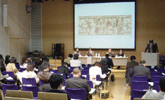Project outline / Plan / Research groups
Outline of the research divisions
�@ Research into the realities of genocide
�@��Europe
�@��The Balkans, Middle East and former Soviet Union
�@��Asia , Africa , North and South America , Oceania
�@��North East Asia
�A Modern thought and genocide
�@��Racism, eugenics, welfare state and genocide
�@��Totalitarianism and genocide
�@��Ethnic self-determinism, forced migration and genocide
�@��Total war and genocide
�@��Colonial rule and genocide
�B Theories of prevention
�@��Regional wars and genocide
�@��Genocide and international law/ international politics
�@��Social change post-genocide
�@��Memory and symbolism of genocide
�@��Anti-genocide education
Europe
This research division will produce empirical research concerning genocide in Europe from the modern era until today. Based upon this we plan to develop theoretical constructs through comparative research. The specific issues to be dealt with are as follows:
��The typology of genocide
As basic groundwork, we will focus on the Nazis, who executed many different types of genocide, and we will attempt a categorization of these types. Already there are vast amounts of research which have been conducted upon this topic in our country alone, but we will also look to absorb new and groundbreaking research results from around the world. We will consider not only the massacre of the Jews (the Holocaust), but also genocide perpetrated against those such as the Romanians, the physically disabled, homosexuals, labour evaders and the like, all of whom were given the label of �gpeople of no value�h by the Nazis, and will analyze the background, causes, course, and results of this genocide.
��Comparative research into the mechanisms of genocide
From the many instances of genocide which occurred in World War Two in Europe, particular focus will be placed on those perpetrated by Nazi Germany and by Croatia, and, after analyzing the ideologies behind each, the motives and actions of those who planned and those who carried out this genocide will be clarified, as will those of the military, the police, government and local officers who co-operated in these acts. In this way, the specific conditions required for genocide, and the processes involved in its execution can be compared and analyzed. With regards to Nazi Germany, attention will be paid to the �glocal initiative�h force of the occupying administration, whose contribution and co-operation along with the citizens of Poland and the Ukraine , and ethnic Germans, was more significant than the role that Berlin itself played. For Croatia , the role of xenophobic nationalism will be explored, in terms of what wartime conditions led to its rapid development to the point at which it triggered genocide. In both cases, the possibility of resistance and/or rescue for the victims, and the role of third party bystanders, will be closely examined.
��The ideology of genocide: its origins and development
The origins and development of the ideology of genocide, which aims at the total eradication of a �gforeign�h group, will be explained by tracing it through to the �g Auschwitz scientists�h, and its association with modern rationalism, and its relationship to various causes related to the preparation for total warfare. In particular, the principles of selection and expulsion which began to permeate the thought of German society at the same time as the construction of the concentration camp system; and the process of transition whereby the forced sterilization policy of peacetime was replaced by a policy of �geuthanasia�h with the arrival of the war, eventually leading to genocide itself, will be examined.
�� Forced migration and genocide
Forced migration of the local population frequently took place in eastern Europe during World War Two, leading to genocide as an extension of this process. Here, we will examine and compare across various regions the processes leading to genocide which were related to a xenophobic policy of forced migration, which was in turn based on the �gprinciples of the ethnic state�h of modern Europe and Nazi Germany's �gethnic reconfiguration plan�h. At this time, the large-scale expulsion of Germans from the east following the Potsdam Declaration will also be considered.
�� War and genocide
There are several examples of local area genocides conducted in wartime, such as Nazi Germany's massacre at Belgrade , the Babi Yar massacre, the Lidice Village massacre and the Oradour massacre, and these will be compared and contrasted. Here, we will not focus only on the SS who embodied the Nazi ideology, but also on the regular officers and soldiers who conducted �geradication�h as a part of the stabilization movement in captured areas.
��The response of the international community
As one factor behind why such an unprecedentedly large-scale genocide as that perpetrated by Nazi Germany was unable to be prevented from occurring, one may point to the policy of appeasement of the major powers, and the disinterest of the international community. Why was it that even though information concerning the genocide had reached the leaders of the United Kingdom and the United States of America , they did not take the step of releasing this information and attempt to prevent it? We will investigate the dynamics of international politics with respect to the issue of genocide.
�� Toward a view to comparative research Having summarized the above research, we will then construct a framework for conducting comparative research with other large scale genocides such as the Turkish massacre of the Armenians.
The Balkans, Middle East, former Soviet Union
The Balkan Research Division plans to undertake comparative research with the regions of eastern Europe, the Middle East, and the former Soviet Union as our primary focus, examining the realities of massacres, forced migration, and forced unification/ homogenization which took place in these areas from the modern period onwards. As a fundamental concept for our research, we will consider the term �gethnic cleansing�h. �gEthnic cleansing�h as a general phenomenon, refers to the political strategy of one ethnic group forcibly removing another ethnic group from a given geographical area, but in recent years it has come to be used as a technical term in the academic fields of international law, political studies, sociology and history. In this research division, we will propose the following working hypothesis concerning the concept of ethnic cleansing: that it is an act based upon the ideology of a people's state in which a certain ethnic group is the fundamental basis for sovereignty, is carried out in order to establish, strengthen, maintain and expand said nation state, and involves the removal with force of all people not belonging to the sovereign ethnic group from the geographical area that is the real or latent territory of the state. We intend to set as our primary goal, by examining and comparing similar phenomena which have occurred in the abovementioned regions, an assessment of the validity of the above hypothesis. The following four issues will be examined and explicated in detail.
��An examination of the massacres, gang rapes, incarceration and expulsion of residents in Bosnia and Kosovo, which provided the initial model for ethnic cleansing, and an analysis of the political plans and ideologies which gave rise to this violence.
��The establishment of an analytical concept with universal applicability for historical research, through a comprehensive examination of the common features of and differences between genocide (mass slaughter) and ethnic cleansing. In particular, this will involve a comparative examination of the Armenian massacres of 1915, the Nazi Holocaust and other phenomena generally referred to as �ggenocide�h, and the various phenomena which have been labeled ethnic cleansing.
��An investigation into whether it is possible to consider forced migration as a form of ethnic cleansing, through comparative case studies of such events.
��An investigation into whether it is possible to consider naturally occurring acts of violence committed by the general populace incidental to the establishment of an ethnic state, as ethnic cleansing. In concrete terms, we will aim to clarify the common features seen in such incidents as the Pogrom of the nineteenth century Ukraine , the massacre of Muslims as part of the independence movement in Bulgaria , the Kashmir conflicts occurring from the division of India and Pakistan , and the development of the state of Israel and the issue of Palestinian refugees.
Asia, Africa, North and South America, Oceania
While this research division covers a vast geographical area, we intend to consider three issues universal to all regions, on which we will hold workshops and foster debate.
The first issue is that of genocide as a by-product of military conflict. The majority of countries in these regions are developing countries, and since World War Two, they have been the site of numerous military conflicts, most typically in the form of civil wars, and in these conflicts large scale massacres have occasionally taken place. It is our aim to consider, from a comparative point of view, the causes and the characteristics of such acts of genocide.
The second issue is that of the genocide of indigenous peoples. It is an historical fact that in immigrant nation states and in colonial lands, physical and cultural genocide has been carried out against the indigenous inhabitants of these areas. This tends to receive comparatively little academic attention, but is in fact an extremely important phenomenon, both in historical terms and in terms of its present day significance.
The third issue concerns the social restructuring which takes place after incidents of genocide. The question of how societies which have undergone the extremely painful experience of genocide have changed, or are changing will be considered. The issues of reconciliation of differences amongst the populace, which must be faced by the state and by society as a whole in post-civil war situations, the issue of the social integration of indigenous peoples, and the issue of victim compensation all fall within the field of debate.
North-East Asia
In this research division, we intend to consider the various aspects of genocide, using the relationship between Japan and mainland Asia as a fundamental base. As part of this we will firstly consider the facts concerning the physical and cultural genocide carried out by Japan in its time of colonial rule in Taiwan, the Korean peninsula and other regions of Asia, and its effect on these societies, as well as conducting a comparison to Western colonial rule. Additionally, genocide directed against those citizens of the Korean peninsula and Taiwan (and even mainland China ) who found their way (or were brought over) to Japan, will be investigated.
Secondly, work and debate will be conducted to uncover the facts concerning and determining the causes of the massacres which occurred in the course of Japan 's military invasions into China after World War One, in particular following the Manchurian incident.
The third factor we must consider is the reality that the recognition of and response to such historical phenomena remains an outstanding diplomatic factor in terms of the �ghistory issue�h between Japan and its Asian neighbours. Naturally, we intend to further debate concerning what is necessary for Japan and other Asian countries to achieve reconciliation and overcome the past.
We are already scheduling several workshops throughout the year, but additionally we are planning our international symposium in September concerning the issue of the massacre of Koreans and Chinese in the aftermath of the Great Kanto Earthquake.



